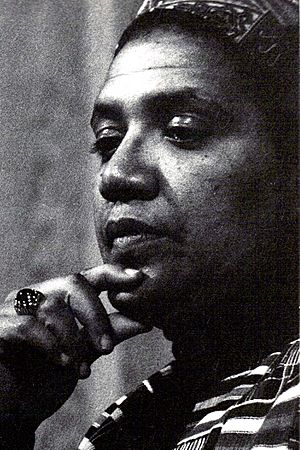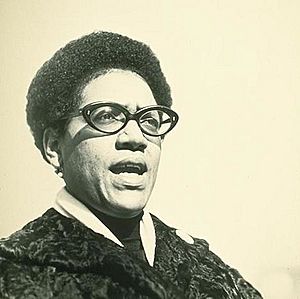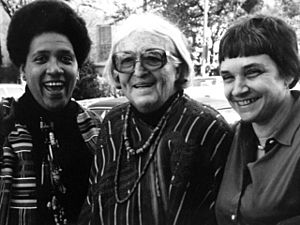Audre Lorde facts for kids
Quick facts for kids
Audre Lorde
|
|
|---|---|

Lorde in 1980
|
|
| Born | Audrey Geraldine Lorde February 18, 1934 New York City, U.S. |
| Died | November 17, 1992 (aged 58) Saint Croix, Virgin Islands, U.S. |
| Education | National Autonomous University of Mexico Hunter College (BA) Columbia University (MLS) |
| Genre | Poetry Nonfiction |
| Notable works | The First Cities Zami: A New Spelling of My Name The Cancer Journals |
| Spouse |
Edwin Rollins
(m. 1962; div. 1970) |
| Partner | Gloria Joseph |
| Children | 2 |
Audre Lorde (born Audrey Geraldine Lorde; February 18, 1934 – November 17, 1992) was an American writer, professor, and activist. She was known for her powerful poems and essays.
Her writings often explored important topics like civil rights, women's rights, and what it means to be a Black woman. She also wrote about living with illness and disability.
Contents
Early Life and Learning
Audre Lorde was born in New York City on February 18, 1934. She was the youngest of three daughters. Her parents were from the Caribbean.
Audre had trouble communicating when she was very young. She found that poetry helped her express herself. She even said she thought in poetry!
She loved to memorize poems and use them to talk. When she was about twelve, she started writing her own poems. She also connected with other students who felt like "outcasts," just like her.
School Days
Audre went to Catholic schools as a child. Later, she attended Hunter College High School. This was a special school for very smart students. She finished high school in 1951.
While at Hunter, Audre published her first poem. It appeared in Seventeen magazine. She also joined poetry workshops.
Audre Lorde's Career

In 1954, Audre spent a year studying in Mexico. This time helped her realize she was a poet. When she returned to New York, she went to Hunter College. She graduated in 1959.
While studying, she worked as a librarian. She kept writing her poems. She then earned a master's degree in library science from Columbia University in 1961.
Audre became a writer-in-residence at Tougaloo College in Mississippi in 1968. This was an important experience for her. She led workshops with young Black students. They often talked about civil rights issues. Her book of poems, Cables to Rage, came from this time.
From 1972 to 1987, Lorde lived on Staten Island. She continued writing and teaching. She also helped start a publishing company called Kitchen Table: Women of Color Press. This was the first U.S. publisher for women of color.
Audre taught English at several colleges. She fought to create a Black studies department at one of them. From 1991 to 1992, she was the State Poet of New York.
In 1981, Audre helped start the Women's Coalition of St. Croix. She also helped create Sisterhood in Support of Sisters (SISA) in South Africa. This group helped Black women affected by apartheid.
In 1985, Audre Lorde visited Cuba. She was part of a group of Black women writers. She felt a strong connection with the Cuban poets she met.
The Berlin Years
In 1984, Audre Lorde became a visiting professor in West Berlin, Germany. She was invited by Dagmar Schultz. During her time there, Lorde became very important to the growing Afro-German movement.
She worked with Black women activists in Berlin. Together, they created the term "Afro-German" in 1984. This helped start the Black movement in Germany. Lorde encouraged German women to use their voices. She believed language was a powerful way to make changes.
Lorde's impact on Germany was shown in a 2012 documentary. It was called Audre Lorde: The Berlin Years 1984–1992. The film won several awards.
Audre Lorde's Poetry

Early Works
Audre Lorde's poems were published often in the 1960s. They appeared in many magazines and books. During this time, she was also active in the civil rights and feminist movements.
In 1968, she published The First Cities, her first book of poems. It was described as a "quiet, thoughtful book." A poet named Dudley Randall said her Black identity was "implicit, in the bone."
Her second book, Cables to Rage (1970), explored themes of love, family, and growing up. It was written while she was teaching in Mississippi.
Her book From a Land Where Other People Live (1973) was nominated for a major award. It showed Lorde's personal struggles and her anger about unfairness. The poems dealt with being a Black woman, a mother, and a friend.
In 1974, New York Head Shop and Museum was released. This book showed her view of New York City. It looked at the civil rights movement and her own childhood.
Wider Recognition
The book Coal (1976) made Audre Lorde a well-known voice. It included poems from her earlier works. She then released Between Our Selves (1976) and Hanging Fire (1978).
In The Black Unicorn (1978), Lorde wrote about her identity. She used ideas from African goddesses of creation and strength.
As she got older, Lorde's poetry became more open. In Sister Outsider: Essays and Speeches, she said that poetry helps us understand things that are hard to name. She believed that exploring our feelings honestly can lead to brave new ideas.
Audre Lorde's Ideas
Audre Lorde believed that people are different in many ways. She thought it was too simple to just think about differences between men and women. She argued that women themselves have many different experiences.
She focused on how race, age, and health issues shaped a person's life. Lorde wrote that all these things were key to her experience as a woman. She said that while gender differences are important, other differences must also be seen and understood.
Personal Life
In 1962, Audre Lorde married Edwin Rollins. They had two children, Elizabeth and Jonathan. They divorced in 1970.
In 1966, Lorde became the head librarian at Town School Library in New York City.
Later, she met Frances Clayton, who became her partner for many years. Audre Lorde also had a long-term partner named Dr. Gloria Joseph. They lived together in St. Croix. They also started several organizations together. These included the Women's Coalition of St. Croix and Sisterhood in Support of Sisters in South Africa.
Last Years
From 1991 until she passed away, Audre Lorde was the New York State Poet laureate. She received an award for her lifetime achievements in 1992.
Audre Lorde passed away from breast cancer on November 17, 1992. She was 58 years old. Before her death, she took an African name, Gamba Adisa. This name means "Warrior: She Who Makes Her Meaning Known."
Honors
- 1979, 1983: MacDowell fellowship
- 1991–1992: New York State Poet laureate.
Legacy
The Callen-Lorde Community Health Center in New York City is named after Audre Lorde. It provides healthcare to the LGBT community.
The Audre Lorde Project, started in 1994, is a group for LGBT people of color in Brooklyn. It works to help communities and promote peaceful activism.
In 2019, Audre Lorde was honored at the Stonewall National Monument in New York City. She was one of fifty "pioneers, trailblazers, and heroes" added to the National LGBTQ Wall of Honor.
Her writings and other materials are kept in archives in the United States and Germany. These help people learn about her life and work.
Interesting Facts About Audre Lorde
- Audre Lorde was very nearsighted. She was almost legally blind.
- She wrote her first poem when she was in eighth grade.
- Her birth name was Audrey Geraldine Lorde. She dropped the "y" from her first name as a child. She liked how "Audre Lorde" looked with the "e" endings.
- In 2014, Lorde was added to the Legacy Walk in Chicago, Illinois. This is an outdoor display that celebrates LGBT history.
- The Audre Lorde Award is given each year to honor lesbian poetry. It started in 2001.
- In 2019, her home in Staten Island was named a landmark.
- In March 2019, Megan Rapinoe of the United States women's national soccer team wore a jersey with Lorde's name on it to honor her.
- On February 18, 2021, Google celebrated her 87th birthday with a Google Doodle.
- In 2022, a crater on Mercury was named Lorde.
- Also in 2022, a street by Hunter College in New York City was renamed "Audre Lorde Way."
Audre Lorde Quotes
- “Your silence will not protect you.”
- “When I dare to be powerful, to use my strength in the service of my vision, then it becomes less and less important whether I am afraid.”
- “Caring for myself is not self-indulgence, it is self-preservation, and that is an act of political warfare.”
- “There is no thing as a single-issue struggle because we do not live single-issue lives.”
- “Pain is important: how we evade it, how we succumb to it, how we deal with it, how we transcend it.”
- “Our feelings are our most genuine paths to knowledge.”
- “Without community, there is no liberation.”
Works
Poetry Books
- The First Cities (1968)
- Cables to Rage (1970)
- From a Land Where Other People Live (1973)
- New York Head Shop and Museum (1974)
- Coal (1976)
- Between Our Selves (1976)
- Hanging Fire (1978)
- The Black Unicorn (1978)
- Chosen Poems: Old and New (1982)
- Our Dead Behind Us (1986)
- The Marvelous Arithmetics of Distance: Poems 1987-1992 (1993)
- The Collected Poems of Audre Lorde (1997)
- Your Silence Will Not Protect You : Essays and Poems (2017)
Prose Books
- The Cancer Journals (1980)
- Zami: A New Spelling of My Name (1983)
- Sister Outsider: Essays and Speeches (1984)
- A Burst of Light (1988)
- I Am Your Sister: Collected and Unpublished Writings of Audre Lorde (2009)
Biographical Films
- A Litany for Survival: The Life and Work of Audre Lorde (1995). A documentary.
- The Edge of Each Other's Battles: The Vision of Audre Lorde (2002). A documentary.
- Audre Lorde – The Berlin Years 1984 to 1992 (2012). A documentary.
See Also
 In Spanish: Audre Lorde para niños
In Spanish: Audre Lorde para niños
 | Aaron Henry |
 | T. R. M. Howard |
 | Jesse Jackson |

